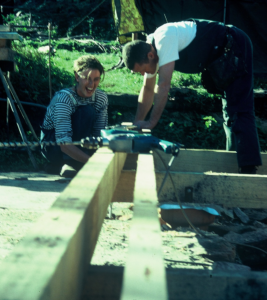Lee Hillam revisits the best (and worst) advice she’s received over the years, from tutors and employers to maternity nurses and fortune cookies.

Dear Me-as-a-recent-graduate,
Hi! I’m writing to you from the future, where all the future things you were worried about have either happened, or didn’t.
I remember you thought getting old meant losing energy and fire. It meant becoming complacent about and protective of the status quo. It meant saying things like “you’ll understand when you’re older” to young passionate people who wanted to change things. Well, so far that hasn’t happened, so relax. On reflection, I do think that I “understand now that I’m older”. I know stuff now I didn’t know when I was you. But next year I’ll probably know more. I hope. It’s a continuum. Or a sine wave, because sometimes you unlearn things, sadly.
So, instead of laying down advice from a fixed position of wisdom and knowledge, I’ve decided I’m going to do a little bit of a recap on the advice you’ve already been given. Because advice is not always good. It’s not always timely. Sometimes it’s bad advice at the time, but good advice a few years later. Sometimes it’s just bad right from the start but you can’t see that until later. Sometimes it makes no sense at all until you’ve done the complete opposite of whatever it was. At that point you get it.
In no particular order, here is some memorable advice we’ve received over the years.
“Don’t wrestle with a pig. You will both get dirty and the pig will enjoy it.”
— Fortune Cookie, Golden Unicorn Restaurant, Maroubra
This is a real keeper. If I’m honest I didn’t understand this at all for a while – and it took intensive workshopping by all those around the lazy susan to decipher it. But then you met that developer guy who refused to pay the last invoice for you and everyone else on the team, including the builders and consultants. The project manager, a man with much more experience than us, shrugged. We started down a long and fruitless path to try to get the developer to pay up. It was awful. There were lawyers. As it went on, the feeling surrounding this whole project got worse and worse, despite it being a beautiful building. And the developer guy just loved the animosity more every minute and he never paid. So, now, this lesson, painfully learnt, can be applied broadly in many situations. Be very careful not to get into arguments with people who do not care about resolving the issue, but only about the argument. Walk away from people who do not have at least some crossover of ethics, intent and humanity. It’s a version of “it takes two to make a fight”, but so much better because of the addition of porcine schadenfreude!
“A good solution solves three problems.”
— Richard LePlastrier
This was said in relation to designing architecture, but it has seemed to me over the years to be a very useful measure in all of life. If you can’t decide between any number of good options, choose the one that answers the most questions at once.
A caution though: at times you’ll be way too ambitious about applying this advice. A solution that solves three problems is good! Don’t keep looking for the solution that solves five or ten!

“If it’s working for you now, keep going. When it stops working, come back to me and I’ll help you change it.”
— Early Childhood nurse, Mascot Family and Community Centre
This advice came a little later, when your first child was a few weeks old. However, with the benefit of this time-travelling letter, I’m pushing this one back to you as a graduate.
Don’t worry about what you should be doing. If you’re engaged, challenged and loving it, keep going. At some point you’ll probably feel like you’re done with whatever it is, and you can work out what the next step is then. For example, when you graduate, you actually really just want to go back to working on site as part of the building team. And you want to keep playing and touring with your band. But you feel like you should be going and getting a ‘real job’, as an architect. Don’t worry. The band will die a natural death and you’ll get sick of building and by then you’ll have your own architecture projects to do. It all works out – though it took a long time for you to go and get a ‘real job’.
“You should wear more ball gowns. You should wear ball gowns every day.”
— First year architecture degree tutor
So, this day, you were late and sneaking in the back of the tutorial in your jeans and sneakers. The tutor, mid-monologue, stops and stares and gives this bit of unsolicited advice. The entire group looks towards you and you want the earth to swallow you up. (Also, get over that crippling shyness. It’s a waste of time and energy).
This is stupid advice, and you should ignore this advice and also the man that gave it. Don’t wear more ball gowns, unless you’re going to a ball, or unless you want to do it Lily Allen style (with sneakers) or Courtney Love style (torn and dirty). Keep your head down and get through the semester. And when you get the opportunity, get involved with Parlour. Their work is doing a lot to make sure women architects are noticed for their talents and skills, and less for their clothing choices.
“If you want to work for God, start by writing a letter to God. If you don’t hear anything in two weeks, write a letter to the next person on the list. Keep going like that until you get a job.”
— Desley Luscombe, then 3rd Year Communications tutor, now Professor of Architecture and ex-Dean of UTS
Sounds like sensible advice, and nothing too radical, but timing is all. This was given to prepare us all for finding our practical placement jobs at the end of third year. I had been trying to work out how I could go home and work on my parents’ farm for six months and call it architectural experience. Mostly because the idea of going out to get a job terrified me. But once Desley said this, I thought, “Ok, f*** it. What have I got to lose?” So, I started with God, which for me as a third year architecture student in 1993, was Richard LePlastrier. They said he didn’t hire students. Actually, they said he didn’t hire anyone. So, I wrote a completely ridiculous letter because I didn’t stand a chance anyway so why not. It was mostly about how dogs know how to be dogs, but humans don’t seem to know how to be humans. Under-grad piffle really. But he gave me a job. And so much good stuff that happened since then and good people you now know can be linked back to that moment. Thanks Desley!
“Judge success by your own terms.”
No-one actually said this to you, but I’m saying it now. There are many criteria by which you can assess your own success, and the success of others (but don’t be too judge-y). Traditionally these are money, power, status, acclaim. It’s completely fine to ignore these. Some other options are freedom, creativity, flexibility, fun, contribution to society, the happiness of people around you, your own happiness, satisfaction, efficiency, small ecological footprint, inspiration, entertainment, growing things… I could go on.
And finally some advice from the world of movies – the best piece of advice ever given by a cartoon fish:
“Just keep swimming, just keep swimming, just keep swimming, just keep swimming, just keep swimming …”
Dory, from Finding Nemo
Lee Hillam is a co-director of Dunn & Hillam Architects and has recently completed a two and a half year stint working for the Government Architect NSW. Dunn & Hillam Architects is a certified B Corp and works on public and private projects.


















